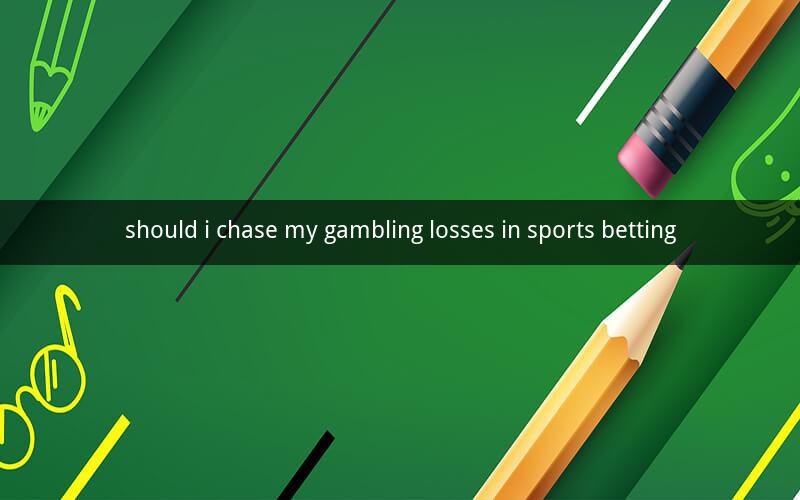
Table of Contents
1. Understanding the Concept of Chasing Losses
2. The Psychological Aspect of Chasing Losses
3. The Financial Consequences of Chasing Losses
4. Strategies to Avoid Chasing Losses
5. The Importance of Setting Limits
6. The Role of Self-Control in Betting
7. The Impact of Chasing Losses on Sports Betting Experience
8. Alternatives to Chasing Losses
9. Seeking Professional Help
10. Conclusion
1. Understanding the Concept of Chasing Losses
Chasing losses in sports betting refers to the behavior of attempting to recoup previous losses by placing larger or more frequent bets. This concept is rooted in the desire to regain what has been lost, but it often leads to further financial strain and psychological distress.
2. The Psychological Aspect of Chasing Losses
The psychological aspect of chasing losses is a complex one. It involves emotions such as frustration, regret, and the fear of missing out. These emotions can cloud judgment and lead individuals to make irrational decisions, such as betting on outcomes they would not normally consider.
3. The Financial Consequences of Chasing Losses
The financial consequences of chasing losses can be severe. Not only can it lead to the depletion of a betting bankroll, but it can also result in significant debt and financial instability. It's important to recognize that the odds are typically stacked against the bettor, making it highly unlikely to recoup losses through betting.
4. Strategies to Avoid Chasing Losses
To avoid chasing losses, it's crucial to adopt strategies that promote responsible betting. This includes setting a budget, sticking to it, and only betting with money that can be afford to lose. Additionally, it's important to understand the odds and bet types, as well as to avoid chasing losses by betting on outcomes that are unlikely to occur.
5. The Importance of Setting Limits
Setting limits is a fundamental aspect of responsible betting. This includes setting a maximum bet size, a maximum number of bets per day, and a maximum loss limit. By adhering to these limits, bettors can prevent themselves from chasing losses and potentially losing more than they can afford.
6. The Role of Self-Control in Betting
Self-control plays a vital role in sports betting. It's important to recognize when emotions are taking over and to take a step back. This can involve taking a break from betting, seeking support from friends or family, or even seeking professional help if necessary.
7. The Impact of Chasing Losses on Sports Betting Experience
Chasing losses can have a detrimental impact on the overall sports betting experience. It can lead to a negative emotional state, reduce enjoyment of the sport, and create a sense of dependency on betting. By avoiding chasing losses, bettors can maintain a positive and enjoyable betting experience.
8. Alternatives to Chasing Losses
Instead of chasing losses, there are several alternatives that bettors can consider. These include diversifying betting strategies, seeking out value bets, and learning from past mistakes. By adopting a more strategic approach, bettors can improve their chances of long-term success.
9. Seeking Professional Help
If chasing losses has become a problem, seeking professional help is essential. This can involve speaking with a therapist, joining a support group, or seeking advice from a financial advisor. Professional help can provide the tools and support needed to overcome the challenges associated with chasing losses.
10. Conclusion
Chasing losses in sports betting is a behavior that can have serious consequences. By understanding the psychological and financial implications, adopting responsible betting strategies, and seeking help when needed, bettors can avoid the pitfalls of chasing losses and maintain a healthy and enjoyable betting experience.
Questions and Answers
1. Q: What is the most common reason people chase losses in sports betting?
A: The most common reason is the emotional desire to recoup previous losses, often driven by frustration and the fear of missing out.
2. Q: Can chasing losses ever be successful?
A: While it is possible to win back some or all of the losses in the short term, the odds are typically against long-term success.
3. Q: How can I tell if I'm chasing losses?
A: Signs include placing larger bets than usual, betting on outcomes you wouldn't normally consider, and feeling compelled to bet more to make up for losses.
4. Q: Is it ever okay to chase losses?
A: No, chasing losses is generally not recommended as it can lead to further financial and emotional distress.
5. Q: What are some alternatives to chasing losses?
A: Alternatives include diversifying betting strategies, seeking value bets, and learning from past mistakes.
6. Q: Can chasing losses lead to addiction?
A: Yes, chasing losses can be a sign of gambling addiction, which can have serious consequences for both the individual and their loved ones.
7. Q: How can I set limits to prevent chasing losses?
A: You can set limits by determining a maximum bet size, a maximum number of bets per day, and a maximum loss limit.
8. Q: Is it normal to feel regret after a losing bet?
A: It's normal to feel regret after a losing bet, but it's important to differentiate between normal emotions and the urge to chase losses.
9. Q: Can I recover from chasing losses?
A: Yes, it is possible to recover from chasing losses with the right strategies, support, and determination.
10. Q: How can I maintain a positive betting experience?
A: To maintain a positive betting experience, focus on responsible betting practices, enjoy the sport, and seek support when needed.